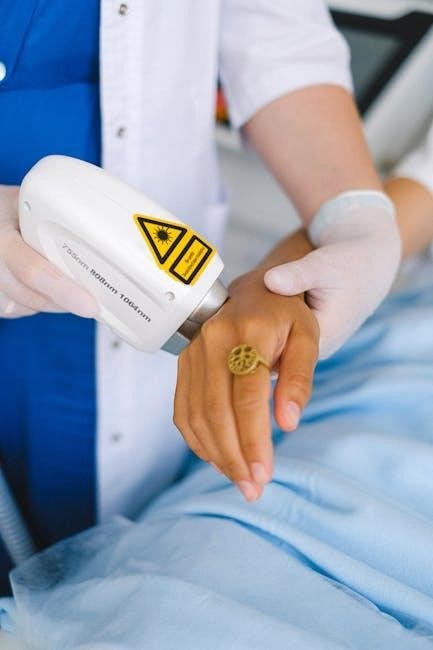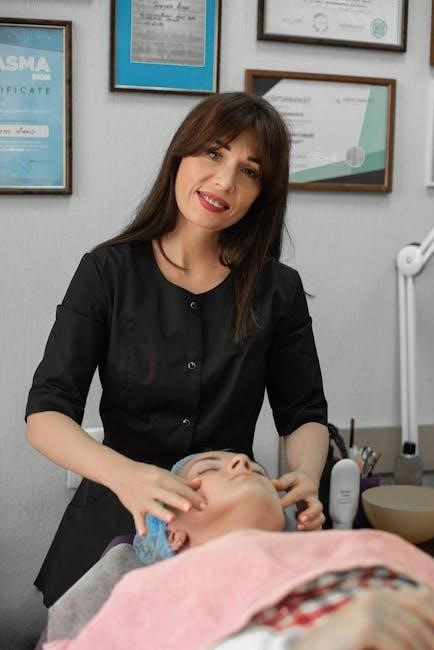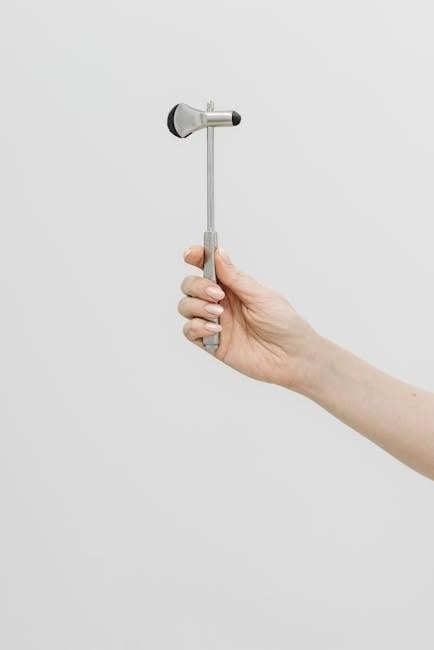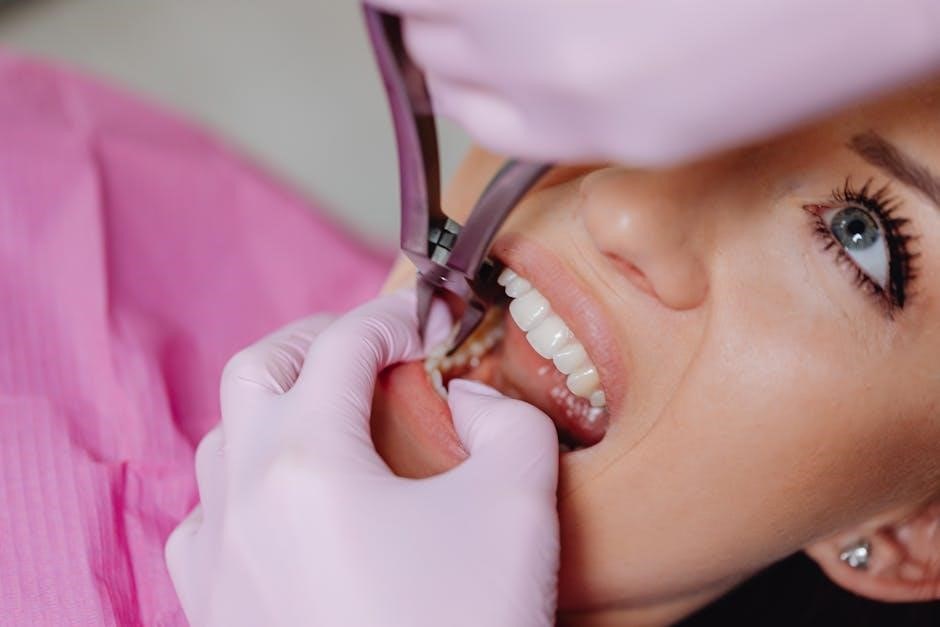psi cosmetology practical exam texas pdf
Master the PSI cosmetology practical exam in Texas with our expert PDF guide. Tips, tricks, and practice tests to ensure you pass with confidence!
The PSI Cosmetology Practical Exam in Texas is a critical step toward obtaining a cosmetology license. Administered by PSI, it assesses practical skills in areas like haircutting, styling, manicuring, and chemical services, ensuring professionals meet Texas licensing standards and demonstrate competence in safe, sanitary practices.
Overview of the Exam Structure
The PSI Cosmetology Practical Exam in Texas consists of two main components: a written exam and a practical exam; The written portion tests theoretical knowledge, while the practical section evaluates hands-on skills in areas like haircutting, coloring, and nail services. Candidates must demonstrate proficiency in sanitation, safety protocols, and specific techniques required by the Texas Department of Licensing and Regulation (TDLR). The practical exam is divided into timed stations, where candidates perform tasks such as setup, disinfection, and service procedures under observation.
Importance of the Practical Exam in Cosmetology Licensing
The practical exam is a cornerstone of cosmetology licensing in Texas, ensuring candidates demonstrate real-world proficiency in essential skills. It verifies their ability to apply theoretical knowledge safely and effectively, adhering to industry standards. This hands-on assessment evaluates competence in tasks like haircutting, coloring, and nail services, guaranteeing professionals are prepared to deliver quality services. Passing the practical exam confirms a candidate’s readiness to practice cosmetology legally and ethically, protecting both clients and the profession’s integrity.

Eligibility Criteria for the PSI Cosmetology Practical Exam
Candidates must complete 900 training hours and meet TDLR’s educational requirements to qualify for the PSI Cosmetology Practical Exam in Texas.
Education and Training Requirements
To qualify for the PSI Cosmetology Practical Exam, applicants must complete 900 hours of training at a Texas-approved cosmetology school. The curriculum covers sanitation, haircutting, coloring, and nail care. Students must be at least 17 years old and earn a high school diploma or equivalent. Training ensures proficiency in both theoretical and practical skills, preparing candidates for the exam. Completion of these requirements is mandatory to receive an eligibility postcard from PSI for the exam.
Application Process and Fees
To apply for the PSI Cosmetology Practical Exam, candidates must submit an application to the Texas Department of Licensing and Regulation (TDLR) after completing 900 training hours. A non-refundable fee is required, typically $25 for the written exam and $30 for the practical exam. Payment can be made via credit card or check. Once eligibility is confirmed, PSI sends an email to schedule the exam at one of their Texas locations. Fees cover exam administration and processing.

Exam Content and Format
The PSI Cosmetology exam includes both written and practical components. The written exam covers theory, safety, and Texas regulations, while the practical assesses hands-on skills like haircutting, coloring, and manicuring. Evaluations focus on accuracy, sanitation, and adherence to safety protocols. The format is standardized to ensure consistency across all candidates.
Written Exam Components
The written exam evaluates theoretical knowledge essential for cosmetology practice. It covers Texas state laws, rules, and regulations, including licensing requirements and sanitation standards. Questions also address fundamental concepts like chemistry, anatomy, and infection control. Additionally, the exam tests understanding of professional ethics and safety protocols. The format typically includes multiple-choice questions, ensuring a comprehensive assessment of a candidate’s readiness to practice safely and ethically in a professional setting. Proper preparation is crucial to succeed in this component of the licensing process.
Practical Exam Components
The practical exam evaluates hands-on skills in cosmetology, focusing on tasks like manicures, haircuts, and chemical services. Candidates must demonstrate proper setup, disinfection, and safety protocols. The exam includes a timed session where candidates perform specific services on mannequin heads or live models, showcasing precision and adherence to Texas licensing standards. Evaluators assess cleanliness, safety, and the final results of the services performed. This component ensures practical competence in real-world scenarios, complementing the theoretical knowledge assessed in the written exam.

Preparation Strategies for the Practical Exam
Utilize official study guides and practice tests to familiarize yourself with exam formats and content. Focus on refining practical skills through hands-on practice and timing drills.
Study Materials and Resources
Official study guides and practice tests from PSI are essential for exam preparation. Mometrix Academy offers free practice exams and resources. Utilize Texas-specific cosmetology study packs for comprehensive review. Focus on both written and practical exam content, including safety protocols and technical skills. Timing drills and hands-on practice enhance readiness. Reviewing state licensing regulations and exam formats ensures familiarity. These resources provide a structured approach to mastering the exam requirements efficiently.
Practice Techniques for Common Exam Tasks
Hands-on practice is vital for mastering common exam tasks like haircutting, coloring, and manicuring. Timing drills help improve speed and accuracy. Break tasks into steps to ensure precision and efficiency. Focus on perfecting techniques under timed conditions to mirror exam pressures. Reviewing safety protocols and sanitation procedures is equally important. Practice on mannequin heads and real clients to build confidence. Utilize video tutorials and practice kits to refine skills in areas like chemical services and nail art. Consistent practice ensures readiness for the practical exam.

Practical Exam Setup and Procedures
The practical exam setup involves pre-exam disinfection, equipment organization, and adherence to safety protocols. Candidates perform tasks like manicures and hair services under timed, clinical conditions.
Pre-Exam Setup and Disinfection
Pre-exam setup requires candidates to organize their equipment and workstation. Disinfection is critical; all tools must be sanitized according to state regulations. This ensures a clean environment and demonstrates adherence to safety protocols. Proper setup includes arranging necessary supplies and maintaining a tidy area. Candidates are evaluated on their ability to prepare efficiently and follow health guidelines, reflecting real-world professional standards. This step is foundational for a successful practical exam performance.
Manicure Service Requirements
Manicure services in the PSI exam require precision and adherence to Texas state standards. Candidates must demonstrate proper techniques, including nail shaping, cuticle care, and polish application. Sanitation is emphasized throughout, with all tools disinfected. The manicure station must be neatly organized, and services must be completed within the allotted time. Evaluators assess both technical skill and attention to detail, ensuring candidates can deliver a professional-quality manicure safely and efficiently, meeting the expectations of the Texas cosmetology licensing criteria.

Safety and Sanitation Protocols
Safety and sanitation are critical in the PSI Cosmetology Practical Exam. Proper disinfection of tools, handwashing, and use of disposable supplies are mandatory. Clean workspaces and adherence to infection control practices are rigorously evaluated to ensure client safety and hygiene standards are met.
Importance of Safety in Cosmetology Exams
Safety is paramount in cosmetology exams as it ensures client well-being and demonstrates professional competence. Proper infection control, chemical handling, and tool sanitation are rigorously evaluated. Adhering to safety protocols minimizes risks of adverse reactions and infections, showcasing a commitment to ethical practices. By prioritizing safety, candidates not only protect clients but also uphold industry standards, making it a critical component of the licensing process and professional reputation.
Sanitation Procedures During the Exam
Sanitation is a cornerstone of the PSI Cosmetology Practical Exam in Texas. Candidates must demonstrate strict adherence to hygiene protocols, including proper handwashing, disinfection of tools, and use of disposable materials. Workstations and equipment must be thoroughly sanitized before and after each task to prevent cross-contamination. These procedures are meticulously evaluated to ensure compliance with state and industry standards, emphasizing the importance of maintaining a clean and safe environment for clients and examiners alike.

Manicuring and Nail Care Services
Manicuring and nail care services are key components of the PSI Cosmetology Practical Exam in Texas. The exam evaluates candidates’ skills in performing basic manicures, nail art, and specific techniques, ensuring precision and adherence to Texas licensing standards.
Manicure Techniques and Expectations
The PSI Cosmetology Practical Exam in Texas evaluates manicure techniques, including nail shaping, cuticle care, and polishing. Candidates must demonstrate precision and adherence to Texas licensing standards. Proper use of tools and maintenance of safety and sanitation protocols are critical. The exam assesses the ability to perform a basic manicure efficiently, showcasing attention to detail and professionalism. Expectations include achieving a smooth, even finish and ensuring client comfort throughout the service.
Nail Art and Design Requirements
Nail art and design are key components of the PSI Cosmetology Practical Exam in Texas, testing creativity and precision. Candidates must demonstrate skill in applying intricate designs, ensuring symmetry and detail. The exam evaluates the ability to use various techniques, such as freehand painting, stamping, and gel art. Proper use of tools and materials is essential. Designs must be original, showcasing the candidate’s artistic ability while adhering to Texas licensing standards and client expectations for professionalism and aesthetics.
Hair Services in the Practical Exam
Hair services in the PSI Cosmetology Practical Exam include haircutting, styling, and chemical processes. Candidates must demonstrate precision, safety, and adherence to Texas licensing standards, ensuring client satisfaction and hygiene protocols are met during the evaluation of their technical skills.
Hair Cutting and Styling Techniques
The PSI Cosmetology Practical Exam in Texas evaluates candidates’ proficiency in hair cutting and styling techniques. These include precision cuts, layered styles, and shaping methods, ensuring a polished finish. Proper use of scissors, razors, and blow dryers is assessed to demonstrate mastery of foundational skills and attention to detail.
Candidates must showcase their ability to achieve the desired look while maintaining safety and sanitation protocols. The evaluation focuses on technical accuracy, evenness, and the final appearance of the style, reflecting the standards required for licensure in Texas.
Chemical Services and Safety Precautions
The PSI Cosmetology Practical Exam in Texas evaluates applicants’ skills in chemical services, including hair coloring, perms, and relaxers. Safety precautions are critical, as candidates must demonstrate proper handling of chemicals, use of protective gear, and sanitation practices to prevent accidents and ensure client safety. The exam assesses adherence to safety protocols, accurate application techniques, and ability to minimize risks during chemical treatments, reflecting Texas licensing standards for cosmetologists.
Texas-Specific Requirements
In Texas, cosmetology licensure requires completing 1,000 training hours and passing both written and practical exams administered by PSI, adhering to state-specific regulations and standards.
State Licensing Regulations
In Texas, cosmetology licensing requires completion of 1,000 training hours and passing both written and practical exams. The Texas Department of Licensing and Regulation (TDLR) mandates these requirements to ensure competency. PSI administers the exams, which cover state-specific regulations and skills. Applicants must demonstrate proficiency in areas like sanitation, safety, and practical techniques. Out-of-state applicants must pass the practical exam in Texas. The licensing process ensures adherence to state standards, protecting public health and safety in cosmetology services.
Unique Exam Features in Texas
The Texas PSI Cosmetology Practical Exam emphasizes strict adherence to state-specific protocols, such as mandatory in-state testing for practical exams. Unique features include a strong focus on pre-exam setup and disinfection, reflecting Texas’s commitment to safety. The exam also incorporates Texas-specific evaluation criteria, ensuring candidates meet regional standards for cosmetology services. These distinct requirements highlight Texas’s rigorous approach to licensing, ensuring professionals are well-prepared to meet industry demands within the state. This tailored exam structure underscores the importance of local compliance and excellence in cosmetology practice.
Scoring and Evaluation Criteria
The PSI Cosmetology Practical Exam in Texas uses a detailed scoring system, evaluating techniques, safety, and sanitation. Candidates are assessed on professionalism, adherence to protocols, and service quality, with scores reflecting their mastery of practical skills and theoretical knowledge, ensuring compliance with state licensing standards.
Written Exam Scoring System
The written exam for the PSI Cosmetology Practical Exam in Texas is scored based on a percentage system, with candidates needing at least 70% to pass. Questions cover Texas state laws, safety protocols, and theoretical cosmetology concepts. Each question contributes equally to the final score, ensuring a fair assessment of knowledge. The scoring system evaluates understanding of key principles, such as sanitation, chemical safety, and professional standards. Results are combined with the practical exam to determine licensure eligibility, ensuring comprehensive readiness for professional practice.
Practical Exam Evaluation Metrics
The practical exam is evaluated based on strict criteria, including demonstration of technical skills, adherence to safety protocols, and professionalism. Assessors score tasks such as haircutting, coloring, and manicuring, focusing on precision, cleanliness, and client satisfaction. Time management and ability to complete tasks within allotted periods are also considered. The evaluation ensures candidates meet Texas state standards for cosmetology licensure, emphasizing both technical proficiency and adherence to hygiene practices to guarantee public safety and professional competence.

Common Challenges and Solutions
Candidates often face time management issues and nervousness during the practical exam. Practicing tasks under timed conditions and using relaxation techniques can help build confidence and improve performance.
Time Management During the Exam
Effective time management is crucial for success in the PSI Cosmetology Practical Exam. Candidates must allocate time wisely for each task, such as setup, disinfection, and service completion. Practicing tasks under timed conditions helps build efficiency. Prioritizing steps and avoiding procrastination ensures all requirements are met within the allotted time. Staying focused and maintaining a steady pace prevents running out of time, allowing candidates to demonstrate their skills effectively and meet the exam’s expectations. Proper planning and execution are key to achieving a passing score.
Overcoming Nervousness and Stress
Nervousness and stress are common during the PSI Cosmetology Practical Exam, but manageable with the right strategies. Deep breathing exercises and positive affirmations can help calm nerves. Visualizing success and focusing on preparation can boost confidence. Candidates should remind themselves of their training and expertise, breaking tasks into manageable steps. Maintaining a steady pace and staying present reduces anxiety. Remember, stress is natural, but proper mindset and preparation can help overcome it, ensuring a smooth and successful exam experience. Stay focused and trust in your abilities.

Post-Exam Procedures
After completing the PSI Cosmetology Practical Exam, candidates receive immediate results. Passing candidates are guided through the licensure process, while those who fail receive performance feedback for improvement.
Receiving Exam Results
Upon completing the PSI Cosmetology Practical Exam, candidates receive immediate results. A passing score is required to proceed with licensure. Results are typically displayed on the exam screen or provided via email. Candidates who pass are issued a score report and instructions for obtaining their license. Those who fail receive a detailed breakdown of their performance, highlighting areas for improvement. Retaking the exam is allowed, following the required waiting period and re-registration with PSI.
Licensure Process After Passing
After passing both the written and practical exams, candidates complete the licensure process. PSI notifies TDLR of exam results. Applicants submit all required documents and fees. TDLR reviews the application and issues the Cosmetology Operator License. Licenses are typically mailed within a few weeks. Candidates can check their application status online. Once licensed, professionals must adhere to Texas’ continuing education requirements for renewal. The license allows them to legally practice cosmetology in Texas, marking the final step in their journey.

Future of Cosmetology Exams
Technological advancements and evolving exam formats are reshaping cosmetology licensing. PSI continues to innovate, ensuring exams remain relevant and effective in assessing skills, while maintaining high standards.
Technological Advancements in Exam Administration
Technological advancements are transforming the administration of cosmetology exams. PSI utilizes online platforms for registration, scheduling, and test delivery, enhancing accessibility and efficiency. Digital tools enable real-time monitoring and scoring, ensuring accuracy and fairness. Virtual simulations and interactive modules are being integrated to assess practical skills more effectively. These innovations streamline the exam process, reduce administrative burdens, and provide candidates with a seamless experience. Such advancements ensure exams remain modern, relevant, and aligned with industry standards, preparing professionals for future challenges in cosmetology.
Evolution of Practical Exam Formats
The practical exam formats for cosmetology licensing in Texas have evolved significantly, incorporating modern techniques and technologies. Traditionally, exams focused on manual demonstrations, but today they include digital assessments and virtual simulations. PSI now offers interactive modules to evaluate skills more comprehensively. These changes aim to enhance accuracy and adapt to industry advancements. The integration of real-time evaluation systems ensures consistency and fairness. Such evolutions keep exams aligned with current practices, preparing candidates for the demands of the cosmetology field while maintaining high standards of professionalism and competence.
Additional Resources
Access study packs and practice tests from PSI for cosmetology exams. Mometrix Academy offers free practice exams and guides to help candidates prepare effectively for the Texas exam.
Recommended Study Guides and Materials
For the PSI Cosmetology Practical Exam in Texas, candidates can benefit from official PSI study guides and practice tests. Mometrix Academy offers free practice exams and detailed guides to help prepare for both written and practical components. Additionally, cosmetology exam prep books and online resources, such as flashcards and video tutorials, are available to enhance understanding of safety protocols, technical skills, and state-specific requirements. These materials ensure comprehensive preparation for the exam, covering all necessary topics effectively.
Online Communities and Forums for Exam Preparation
Online communities and forums are invaluable resources for preparing for the PSI Cosmetology Practical Exam in Texas. Platforms like cosmetology forums and Facebook groups connect candidates with professionals and past examinees, offering tips and strategies. Websites like Mometrix Academy provide free practice tests and study guides; Additionally, Reddit and specialized beauty forums often feature discussions on exam experiences and advice. These resources help candidates stay informed, address challenges, and build confidence for the exam. Utilizing these communities can enhance preparation and success.

